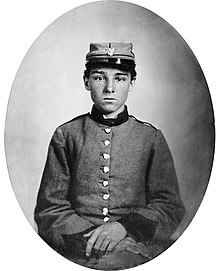| Edwin Francis Jemison | |
|---|---|
 Jemison in uniform, ca. 1862 Jemison in uniform, ca. 1862 | |
| Born | (1844-12-01)December 1, 1844 Milledgeville, Georgia, U.S. |
| Died | July 1, 1862(1862-07-01) (aged 17) Henrico County, Virginia |
| Allegiance | |
| Service | |
| Years of service | 1861–1862 |
| Rank | Private |
| Unit | Company B (Moore's Guards) Company C, 2d Louisiana Infantry |
| Battles / wars | American Civil War |
Edwin Francis Jemison (December 1, 1844 – July 1, 1862) was an American Confederate soldier who served in the 2nd Louisiana Infantry Regiment from May 1861 until he was killed in action at the Battle of Malvern Hill.
Jemison's photograph has become one of the iconic portraits of the young soldiers of both the Confederate and Union armies. It was featured particularly on the cover of the American Russian-language magazine Amerika in 1991.
Early life
Jemison was born on December 1, 1844, in Milledgeville, Georgia as the second-oldest of five sons of Robert Jemison and Sarah Caroline Jemison (née Stubb), who had married in 1841. Robert Jemison was a landowner, lawyer and newspaper editor. The family later moved to Jackson, Louisiana where they lived at the outbreak of the Civil War. On January 26, 1861, Louisiana seceded from the United States to join the Confederate States.
American Civil War
Jemison enlisted on May 11, 1861, in Company B (Moore's Guards) of the 2nd Louisiana Infantry Regiment, and was among the war's early volunteers. He participated in the Peninsula Campaign under Maj. Gen. Magruder. Jemison was signed on at Camp Walker in New Orleans by Captain J.M. Galt. By May 1862 Jemison moved to Company C (the Pelican Grays).
Death
Jemison was killed on July 1, 1862, at the Battle of Malvern Hill. The circumstances of his death will likely never be fully known, though a popular story emerged of a direct hit from a cannonball which decapitated him. The cause of his death has since been called into question. The death by cannon fire story was corroborated by the 1887 obituary of his younger brother, Sam, but incorrectly identifies the battle as First Manassas. Biographer Alexandra Filipowski debunks the tale altogether. A veteran named Captain Moseley told the gruesome story of the decapitation to crowds all over the south, often for money. At one such event, Jemison's brother was in attendance and drew his own conclusion, stating "that was my brother." It has since been shown, however, that Moseley did not fight at Malvern Hill and could not have witnessed Private Jemison's demise. Filipowski cites Jemison's obituary as the only actual known account of his death: "He sustain himself in the front rank of the soldier and gentlemen until the moment of his death. Bounding forward at the order ‘Charge!’ he was stricken down in the front rank, and without a struggle yielded up his young life."
Burial
Following the Battle of Malvern Hill, both sides buried their dead on the battlefield. After the American Civil War, Neo-Confederate organizations like the United Daughters of the Confederacy returned to the old battlefields and disinterred the bodies of fallen Confederate soldiers and gave them proper burials in places like the Confederate Section of Hollywood Cemetery in nearby Richmond, Virginia. It is thought that Jemison's parents erected the monument to him at Memory Hill Cemetery in Milledgeville, Georgia, where he may be buried. Most believe that he was buried on or near the Malvern Hill battlefield in Henrico County, Virginia, in an unmarked grave.
See also
References
- "Obituary: Edwin Francis Jemison". Southern Recorder. August 5, 1862. p. 3.
- "Identity of Civil War soldier corrected". SouthCoastToday. Associated Press. Archived from the original on July 24, 2015. Retrieved July 24, 2015.
- Amerika, September 1991, issue 418
- ^ A. J. Schenkman (2021). Unexpected Bravery: Women and Children of the Civil War. Rowman & Littlefield. p. 82. ISBN 978-1493055272.
- ^ Cox, Dale. "Best Known Confederate Soldier". ExploreSouthernHistory. Retrieved July 24, 2015.
- Field, Ron; Hook, Richard (2006). The Confederate Army 1861-65 (3): Louisiana & Texas. Osprey Publishing. p. 17. ISBN 1846030315.
- Jones, Terry L. (2006). The Louisiana Journey. Gibbs Smith. p. 193. ISBN 1423601300.
- Miller, William J. (May 2004). "The Two Pictures of Private Jemison". America's Civil War: 32.
- "End of a Brilliant Lawyer". The Ouachita Telegraph. January 1, 1887. Retrieved July 24, 2015.
the second was killed, with his messmate, by a cannon shot at the first battle of Manassas
- Alex; Filipowski, ra; Harrington, Hugh T. (November 20, 2018). "The Mystery of Private Edwin Jemison". HistoryNet. Retrieved July 1, 2020.
- Filipowski, Alexandra; Harrington (May 2007). "Hugh T.". America's Civil War: 28.
- Filipowski, Alexandra; Harrington, Hugh T. (May 2004). "America's Civil War: Where Does Private Jemison Rest". America's Civil War. Retrieved July 24, 2015.
External links
- Edwin Francis Jemison at Find a Grave
- NPS Soldier Database entry
- Private Edwin Jemison: The Boy Soldier
 Media from Commons
Media from Commons Quotations from Wikiquote
Quotations from Wikiquote Data from Wikidata
Data from Wikidata
- 1844 births
- 1862 deaths
- Confederate States Army soldiers
- Confederate States of America military personnel killed in the American Civil War
- People from Milledgeville, Georgia
- People notable for being the subject of a specific photograph
- People of Georgia (U.S. state) in the American Civil War
- Child soldiers in the American Civil War
- Photographs of children in war